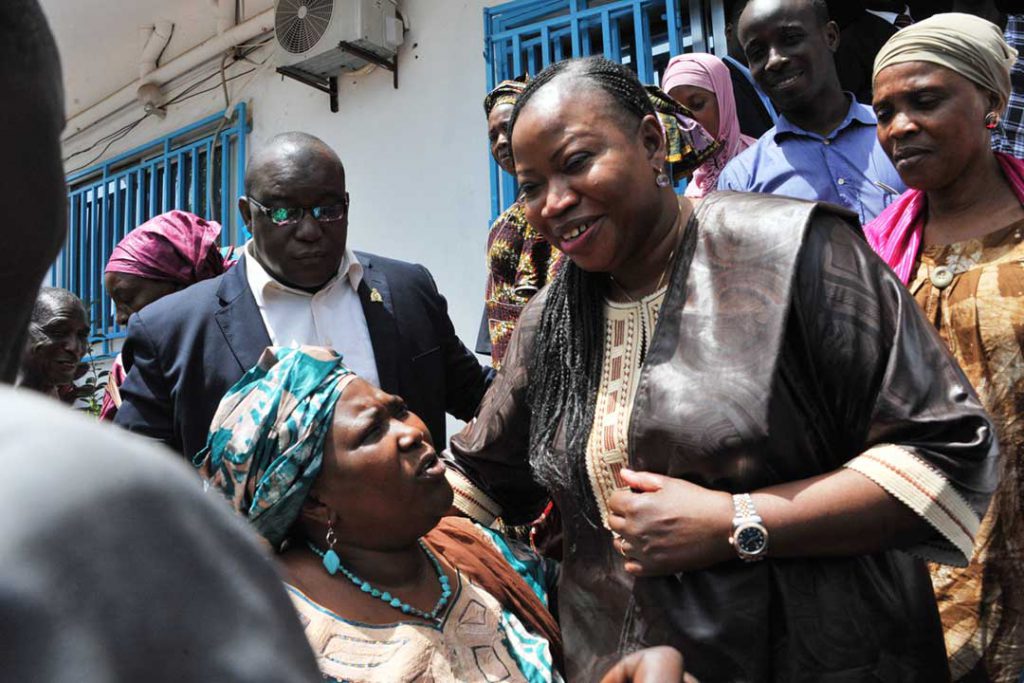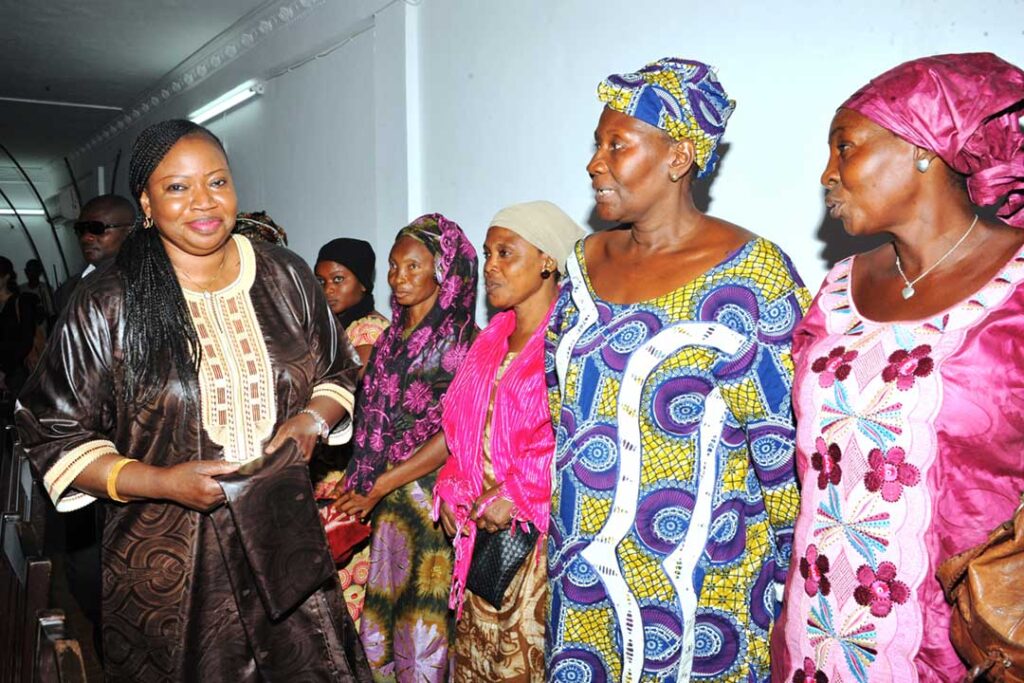
The trial of Hissène Habré, Chad’s former tyrannical ruler, has raised hopes that new systems of so-called hybrid justice can be developed. The Extraordinary African Chambers (EAC), a new body established by the African Union (AU) within the Senegalese court system, is hearing the Habré trial. It marks the first time that the courts of one African nation have tried the former leader of another African country, and the first time a universal jurisdiction case has proceeded in Africa. After an initial adjournment, Mr Habré’s trial recommenced in September. Mr Habré, who ruled Chad from 1982 to 1990, is accused of war crimes, crimes against humanity and torture during his presidency. It is alleged that he personally presided over a network of secret police, known as the Directorate of Documentation and Security (DDS), which was responsible for the arrest, torture and disappearance of political and civil society opponents. A Chadian truth commission estimated that as many as 40,000 people were killed and many more tortured during his rule.
Mr Habré’s dramatic attempts to disrupt the process have twice overshadowed the opening of the trial. In July he refused to speak to the presiding judge, dismissed his defence team and had to be carried out of court. When the case resumed on September 7th, Senegalese security agents wearing ski masks carried him to the bench and held him down while he shouted “Shut up!” at a court clerk who was reading out the names of his alleged victims. Despite the theatrics, the presiding judge, Gberdao Gustave Kam, has re-established order. Having been adjourned in July for 42 days to allow a court-appointed defence team to prepare — Mr Habré refused to meet or speak to them — the case is now proceeding. Nevertheless Mr Habré has now been forced to sit for weeks listening to the horrifying testimonies from former alleged victims, including accounts of “arbatatchar” — a stress position in which a detainee’s knees and elbows were tied behind their backs. In some cases, prisoners were forced to insert car exhaust pipes into their mouths while the engine was running.
The court heard about Mr Habré’s alleged systematic attacks on the rebellious Hadjerai and Zaghawa ethnic groups. It saw his cold comments in an official communiqué about 152 prisoners of war: “No detainee shall leave this prison unless in case of death.” In recent weeks testimonies from women who claim they were kidnapped and used as sexual slaves have been heard, as well as those from former detainees who spoke of watching fellow inmates die of disease or starvation, and then having to dig mass graves for their bodies. The story of how Mr Habré finally came to face justice is long and complex. It owes much to the determination of a group of victims and their lawyers, including Souleymane Guengueng, Jacqueline Moudeina and Clément Abaifouta, who documented hundreds of abuse cases and fought tirelessly for 25 years to bring him to court. A military coup led by his former defence minister and now Chad’s current president, Idriss Déby Itno, toppled Mr Habré in 1990.
As his power base dissolved, Mr Habré emptied Chad’s meagre coffers and fled to Dakar, Senegal’s capital, where he lived in an upmarket suburb. Ten years later, victims’ groups succeeded in persuading a Senegalese judge to indict Mr Habré. But Senegal’s then president, Abdoulaye Wade, seemed unwilling to hang a fellow African leader out to dry and the indictment went nowhere. Several attempts by the AU and Economic Community of West African States to establish courts to try him followed in the 2000s, which also failed because of legal wrangling and disputes over who should pay the bill. Victims even filed a complaint in Belgium, which has universal jurisdiction, a legal concept which allows states to try persons accused of crimes against humanity regardless of where the alleged crimes were committed and regardless of the accused’s nationality. But Senegal failed to respond to several extradition requests for the former leader, until Macky Sall was elected the country’s new president in 2012; he promised to resolve the issue after the UN’s International Court of Justice reprimanded the country for failing to respect its international obligations.
A budget for the EAC was announced — $11m provided by Chad, the European Union, the AU and the Netherlands, among others. Finally, in July 2013 Senegalese police arrested Mr Habré and detained him in the Dakar jail opposite the court. The case raises the question of whether this hybrid African justice model could offer an alternative to the International Criminal Court (ICC), based in The Hague. Many on the continent criticise the ICC and accuse it of bias for prosecuting only African tyrants who are extradited to Europe for trial. The EAC model has been praised for offering victims a more approachable system within a national court, and a way to repatriate their justice. “This approach can provide for compliance with international law and standards while bringing the trials closer to the victims and strengthening the skills and confidence of the local judges and officials who will continue in their national systems after the trials are completed,” said Stephen Rapp, former ambassador-at-large and head of the Office of Global Criminal Justice in the US State Department, who has been following the trial.
Andrea Ori, a representative of the UN Office of the High Commissioner for Human Rights in west Africa, agrees. “This is finally combatting the culture of impunity, and it’s important that national courts are able to do this,” he said. “The AU took responsibility for this, it’s not a Western process.” The case is also influencing many Chadians’ expectations of justice and the role it can play in improving governance. For many years the subject of Mr Habré elicited an often weary and pessimistic response from ordinary Chadians who had come to see impunity as a way of life. Though hopes were raised by Mr Habré’s arrest in 2013, it is only now that people seem to be taking an interest. Grants from the Open Society Initiative for West Africa totalling around $180,000 have allowed several Chadian journalists to travel to Dakar to cover the trial. The case is being filmed for the historical record, although the Chadian government has reportedly not allowed it to be broadcast. The case against Mr Habré has already had a profound impact on Chadian justice.
In late March a criminal court in N’Djamena, the capital, convicted 20 of Mr Habré’s senior lieutenants of torture, according to Human Rights Watch (HRW), a New York-based monitoring group. The court sentenced Saleh Younous, the former head of the DDS, and Mahamat Djibrine, considered one of Chad’s most feared torturers, to life imprisonment. The court also ordered the government and the convicted persons to pay $125m in reparations to more than 7,000 victims. This trial complicated the investigations in preparation for the EAC case because many of Mr Habré’s accomplices are now not able to appear beside him in Dakar given that they are already in prison in Chad. Nevertheless it gave an unprecedented boost to the rule of law in Chad, as many of these figures had been living openly without fear of arrest since Mr Habré’s downfall. These developments show that the culture of impunity is finally being challenged, claims Reed Brody, counsel with HRW, which has been supporting the victims’ battle for justice for 16 years.
“I think what scares the power structure about the trial is that it is Chadian civil society, an activist sector that the government is doing its best to contain, which has brought Habré to justice,” he said. “That in itself is very subversive to an authoritarian system.” Much remains to be done, however. The case needs to proceed, reach its conclusion and pass a respectable verdict without being derailed by Mr Habré’s vocal rejection of the court’s authority. The issue of whether the principle of universal jurisdiction can be used in the future may also prove problematic after the AU issued a strongly worded communiqué about its potential “abuse” following the arrest of a Rwandan general in London in July 2015 on a warrant issued in Spain. Though the initial signs are encouraging, any future attempts to create hybrid systems will need continent-wide political will to back them up, argues Alioune Tine, Amnesty International’s west Africa director: “The general issue of impunity is far from being resolved at the level of the AU as far as the political and military elite are concerned. But I do think that the Habré trial opens up a whole new era in the fight against impunity, which could take a concrete form in the future.”



